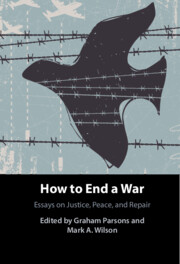Book contents
- How to End a War
- How to End a War
- Copyright page
- Contents
- Contributors
- Acknowledgments
- Introduction
- Chapter 1 The Lament of the Demobilized
- Chapter 2 Moral Injury and Moral Failure
- Chapter 3 Stoic Grit, Moral Injury, and Resilience
- Chapter 4 Political Humiliation and the Sense of Replacement
- Chapter 5 Minimum Moral Thresholds at War’s End
- Chapter 6 Ending Endless Wars
- Chapter 7 Forever Wars
- Chapter 8 Two Conceptions of the Proportionality Budget for Jus Ex Bello
- Chapter 9 Toward a Post Bellum Lieber Code
- Chapter 10 Reconciliation Is Justice – and a Strategy for Military Victory
- Bibliography
- Index
Chapter 2 - Moral Injury and Moral Failure
Published online by Cambridge University Press: 02 March 2023
- How to End a War
- How to End a War
- Copyright page
- Contents
- Contributors
- Acknowledgments
- Introduction
- Chapter 1 The Lament of the Demobilized
- Chapter 2 Moral Injury and Moral Failure
- Chapter 3 Stoic Grit, Moral Injury, and Resilience
- Chapter 4 Political Humiliation and the Sense of Replacement
- Chapter 5 Minimum Moral Thresholds at War’s End
- Chapter 6 Ending Endless Wars
- Chapter 7 Forever Wars
- Chapter 8 Two Conceptions of the Proportionality Budget for Jus Ex Bello
- Chapter 9 Toward a Post Bellum Lieber Code
- Chapter 10 Reconciliation Is Justice – and a Strategy for Military Victory
- Bibliography
- Index
Summary
Military service members may perform an action – such as killing – that they realize is the best thing to do in some situation, but that nevertheless strikes them as being morally wrong or even unthinkable. Such unavoidable moral failure may involve feelings of extreme distress and self-destructive behavior, together constituting a ‘moral injury.’ Service members (or veterans) often feel an anguished sense of responsibility in these cases, while other people do not tend to think it is right to hold them responsible. I defend this mismatch of reactions against the claim that servicemembers cannot be responsible for actions that were unavoidable, arguing that this denies something important that their distress reveals. Their tendency to hold themselves responsible may be a fitting response that correctly represents how it matters subjectively to them that their own action was unthinkable. However, others cannot hold them responsible because they have not violated fair, shared, normative expectations.
Keywords
- Type
- Chapter
- Information
- How to End a WarEssays on Justice, Peace, and Repair, pp. 31 - 58Publisher: Cambridge University PressPrint publication year: 2023



